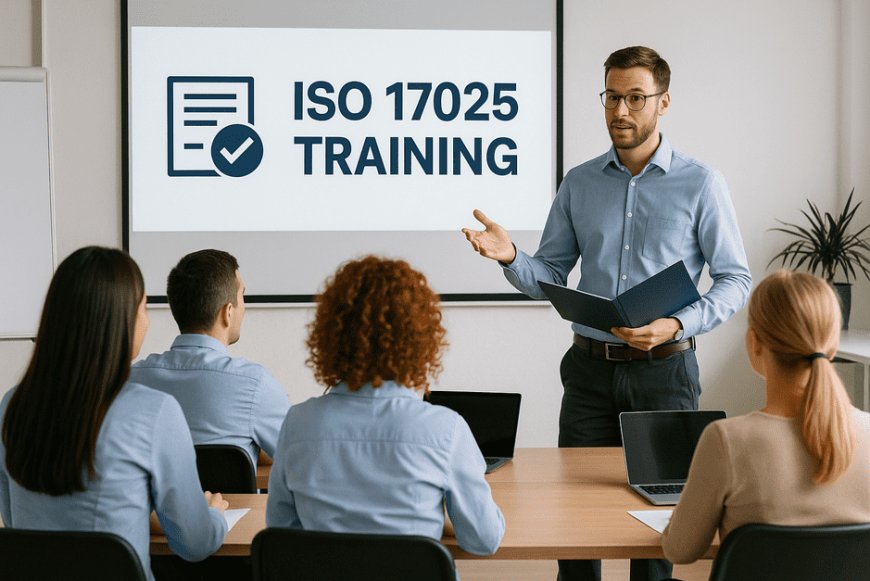Why ISO 17025 Training Feels Like Learning to Fly
Elevate your skills with ISO 17025 training for accreditation success. Master testing and calibration within industry standards with expert guidance.

Picture this: you're standing at the edge of a runway, staring at a sleek, complex aircraftyour laboratory's quality management system. ISO 17025 is the flight manual, and as a consultant or trainer, you're the one teaching others how to pilot it. Daunting? Sure. But with the right training, its less about memorizing controls and more about mastering the art of smooth navigation. Lets explore what ISO 17025 training is all about, why it matters, and how you can guide labs to soar with confidence.
Whats ISO 17025, Anyway?
ISO 17025 is the gold standard for testing and calibration laboratories. Its a set of guidelines ensuring labs produce accurate, reliable resultsthink of it as a promise to clients that the labs work is trustworthy. For consultants and trainers, your job is to help labs understand and implement this standard. Its not just about ticking boxes; its about building a culture of precision and accountability.
Why does this matter? Because labs are under pressure. Clients demand results they can bank on, and a single misstep can erode trust. Training in ISO 17025 equips you to help labs meet these expectations, whether theyre testing soil samples or calibrating medical equipment. Its about giving them the tools to shine in a competitive field.
The Heart of ISO 17025 Training: Knowledge Meets Confidence
Heres the thing: ISO 17025 isnt just a documentits a mindset. Training isnt about memorizing clauses (though, yes, youll need to know those too). Its about teaching labs how to weave quality into their everyday work. As a consultant or trainer, your role is to translate the standards dense language into practical steps.
You might start with the basics: the standards structure, its focus on technical competence, and how it applies to a labs specific operations. But it goes deeper. Youre helping lab staff understand why these processes matter. Ever seen a technicians eyes glaze over when you mention document control? Your job is to make it realshow them how organized records prevent costly mistakes. Maybe share a story about a lab that saved thousands by catching an error early, thanks to a solid ISO 17025 system.
Key Areas to Cover in Training
When youre training, youll focus on a few critical pillars of ISO 17025. These arent just buzzwordstheyre the backbone of a labs operations:
-
Quality Management System: Teach labs how to set up processes that ensure consistency. Its like building a recipe for success that everyone follows.
-
Technical Competence: This is about skillsensuring staff know their equipment inside out. Think of it as training a chef to master their kitchen tools.
-
Measurement Traceability: Results need to be tied to international standards. Its the lab equivalent of showing your work in math class.
-
Document Control: Labs live or die by their records. Teach them how to keep everything organized without drowning in paperwork.
Each of these areas requires a balance of theory and practice. You might lecture on the importance of traceability, then roll up your sleeves and walk a lab through calibrating their equipment. Its hands-on, and thats what makes it rewarding.
Why You Need to Be More Than a Teacher
As a consultant or trainer, youre not just delivering informationyoure inspiring change. Labs often resist new processes. Staff might grumble about extra documentation or question why they need to change whats always worked. Your challenge is to get them on board.
How? Empathy helps. Put yourself in their shoes. A lab technician might be juggling tight deadlines and a mountain of samplesISO 17025 can feel like one more hurdle. Show them how it makes their work easier, not harder. Maybe its faster turnaround times because processes are streamlined. Or fewer errors, so theyre not redoing tests at 5 p.m. on a Friday.
Rhetorical question alert: Have you ever tried to convince someone to try something new when theyre dead-set against it? Thats your daily reality as an ISO 17025 trainer. The trick is to blend authority with relatability. Youre the expert, but youre also the guide who gets why change is tough.
Tools of the Trade: Making Training Stick
Heres a confession: Ive seen trainers bomb because they relied on dry PowerPoint slides. Dont be that person. ISO 17025 training needs to be dynamic. Mix it up with real-world examples, group discussions, and practical exercises. For instance, run a mock audit where trainees identify gaps in a labs processes. Its like a fire drillstressful but eye-opening.
You can also lean on tools like flowcharts or checklists to break down complex requirements. Ever tried explaining risk-based thinking without a visual? Its like describing a sunset to someone whos never seen one. A simple diagram can turn confusion into clarity.
And dont shy away from technology. Software like LabWare or Qualtrax can help labs manage their ISO 17025 systems. Mention these tools in training, but keep it practicalshow how they save time, not just how they meet requirements.
A Quick Tip for Trainers
Want to make your sessions memorable? Tell a story. Maybe its about a lab that nailed ISO 17025 and landed a big client because of it. Or one that struggled until they embraced the standard. Stories stick. Theyre the sugar that helps the technical medicine go down.
Overcoming the Its Too Complicated Myth
Lets address the elephant in the room: ISO 17025 can feel overwhelming. The standard is dense, and labs might think its only for the big players with deep pockets. Your job is to debunk that myth.
Start small. Show labs how to tackle one clause at a timemaybe begin with equipment calibration, something tangible they already do. Build from there. Its like learning to cook: you dont start with a five-course meal; you master a single dish first.
And heres a secret: you dont need to know everything. No one does. ISO 17025 is vast, and even seasoned consultants learn on the job. If a trainee asks a niche question about, say, uncertainty measurement, its okay to say, Great questionlets dig into that together. It shows humility and builds trust.
The Bigger Picture: Why This Matters
Training labs in ISO 17025 isnt just about complianceits about excellence. Labs that embrace the standard often see better efficiency, happier staff, and more satisfied clients. As a trainer, youre not just teaching rules; youre helping labs build a reputation they can be proud of.
Think about it: a lab that gets ISO 17025 right can impact lives. Their accurate results might ensure safe drinking water or reliable medical diagnoses. Thats the kind of ripple effect that makes this work meaningful.
Wrapping It Up: Your Role as a Catalyst
You know whats exciting about being an ISO 17025 consultant or trainer? Youre not just passing on knowledgeyoure sparking transformation. Youre helping labs go from good enough to exceptional. Its not always easy. Youll face resistance, tight schedules, and the occasional blank stare. But when a lab starts running like a well-oiled machine, youll know you made a difference.
So, how do you get started? Brush up on the standard, practice translating its jargon into plain English, and dont be afraid to get hands-on. Whether youre coaching a small environmental lab or a global testing giant, your training can set them up for success. Ready to help them take flight?







































